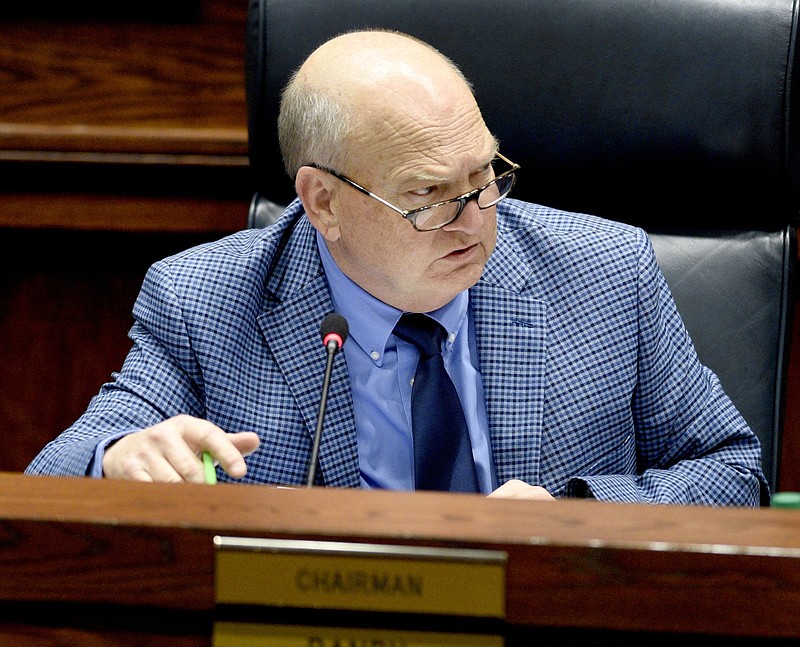The Hamilton County Commission is under fire for cutting off public comments at a Wednesday meeting as citizens called for prison and sheriff department reform and budget cuts.
In a similar but smaller scale demonstration as Tuesday's 7.5-hour Chattanooga City Council meeting, county commissioners heard from many of the same speakers who called for divestment from the Hamilton County Sheriff's Office, ending of private prisons and other local criminal justice reform.
Many of those who addressed the commission were taking part in the 12th day of activism spurred by the May 25 death of George Floyd under the knee of a Minneapolis police officer.
Commission Chairman Randy Fairbanks ended the meeting after a little less than an hour of public comments on the issue, with at least three callers still waiting for their opportunity to speak.
Commissioner Warren Mackey - who headed a statement by local black elected officials condemning the killing of Floyd and promising action last week- told Fairbanks he was "absolutely loving the comments from the people calling in," and encouraged the commission to heed the voices of constituents.
But Fairbanks cited an existing rule which says no one delegation of people will be allowed to address the same issue in public comment for more than 10 minutes.
"Most of the callers have called in and said they want to speak to you about policing, that's the same issue," Attorney Rheubin Taylor advised. "You have far exceeded your time if you consider that they are all calling about the policing, as well as the budgeting of the police department as well as the tactics against peaceful protesters."
Fairbanks then allowed one more speaker to address the commission before Mackey and Commissioner David Sharpe, who represents most of the city and its constituents who were calling in, and Commissioner Chip Baker defended speakers' rights to call in.
Local social justice non-profit the Unity Group of Chattanooga issued a statement late Wednesday condemning the commission for ending the meeting without allowing speakers to finish.
"The Hamilton County Commission was derelict in their duty in not hearing the important issues being raised by this community. There are profound questions surrounding law enforcement engagement, the militarization of law enforcement, mass incarceration and money bail, the school-to-prison pipeline," the statement reads, also condemning much of the county's response to the COVID-19 global pandemic.
"These morally imperative topics merited our full attention, and to choose to be ambivalent to these questions is likened to striking the albatross. Our government still operates under the will of the people, the rule of law and the consent of the governed, and the people deserve to be heard."
Some commissioners seemed to agree.
Sharpe, who chairs the county's corrections and safety committee, earlier called a virtual meeting of the committee for June 19 at 10 a.m. to discuss the matters with the sheriff and relevant county officials. He also provided his cellphone number while live on the call for citizens who felt unheard following Fairbanks' decision. His phone rang immediately.
"If you stood in line, and you wanted to speak, First Amendment, but someone said 'well, time's up,' how would you feel?" Mackey asked Fairbanks.
Sharpe then called for the chairman to allow callers to speak, which was echoed by Commissioner Chip Baker, citing a hearing on wastewater during this same commission term when former Chairwoman and Commissioner Sabrena Smedley had the commission stay until all voices were heard.
Smedley argued that she had encouraged speakers back then and would encourage speakers on this issue to only speak if they had new information, not just to repeat one another.
Though the attorney told Fairbanks he was able to take a vote and overturn the rule with a majority, Fairbanks ended the meeting without a vote or allowing the remaining callers to speak.
In all, the commission spoke about the decision to not allow speakers for roughly 14 minutes, or the length of between four and five additional callers, had they been allowed to speak.
Contact Sarah Grace Taylor at staylor@timesfreepress.com or 423-757-6416. Follow her on Twitter @_sarahgtaylor.
